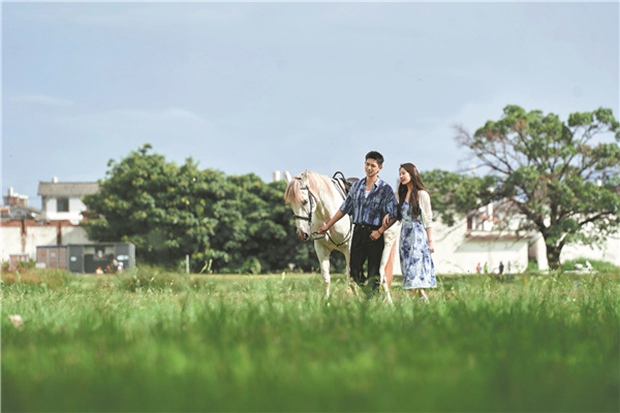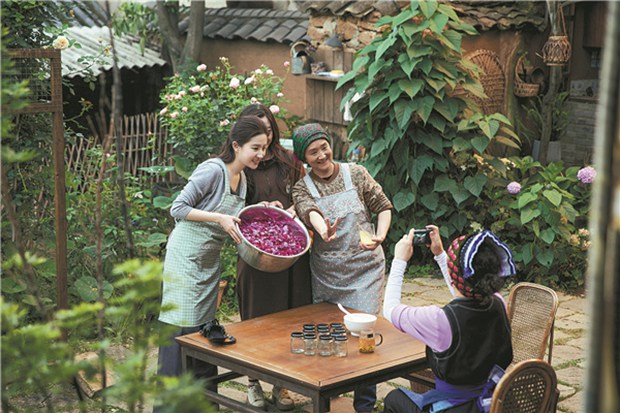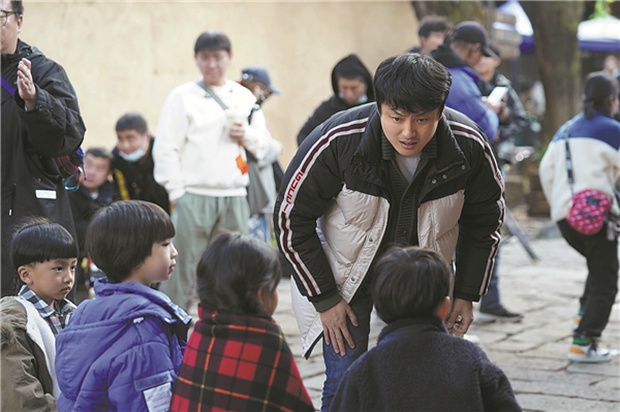Burned-out main character in TV series swaps bustling city streets for natural pursuits, Xu Fan reports.
Nothing is probably more healing than escaping fast-paced metropolitan life to recharge in an idyllic village. This is the option facing Xu Hongdou, an exhausted white-collar city dweller, in the popular TV series, Meet Yourself.
With the protagonist Xu, played by A-list actress Liu Yifei, marking her modern drama debut, the 40-episode series has earned a high score of 8.4 points out of 10 on the country's major review aggregator Douban.
Aside from its domestic run on Hunan Satellite TV, streaming platforms Mango TV and Migu Video, the drama has been distributed overseas, streamed on You-Tube in four subtitled languages — Vietnamese, Indonesian, Spanish and Arabic — to reach a huge viewership of 260 million people. It has also been broadcast in multiple countries in North America, Europe and Asia, and is scheduled to be released in South Korea and Cambodia, according to the distributors.
The popularity of the TV series has boosted the tourism of Yunnan province, the main setting, exemplified by trending hashtags like "Following Xu Hongdou to eat Dali flower cakes" on major social media platforms, including Sina Weibo, according to the Yunnan Provincial Department of Culture and Tourism.
For most viewers, the tale resonates and tugs on their heartstrings. Appearing as an aspiring Beijing five-star hotel manager in the opening episode, Xu leads an intense life, as most young people striving for career success in big cities tend to do. However, the passing away of her best friend, also a young woman once dreaming of a promising future through hard work, prompts her to take a break and rethink the meaning of life.

A scene from the popular TV series Meet Yourself features actor Li Xian and actress Liu Yifei shooting a promotional video to boost tourism in a village in Yunnan province. [Photo provided to China Daily]

Liu (left), playing protagonist Xu Hongdou, holds a pot of petals to make flower cakes, a local delicacy. [Photo provided to China Daily]
She quits the job, wrapping up all her belongings to move to a remote village called Yunmiao in Southwest China's Yunnan province. Although Xu originally plans to stay there for three months, she stumbles upon Xie Zhiyao, a former venture capitalist who returns to the village, his hometown, to launch several businesses including a horse ranch and a dye workshop.
As she delves into the lives of locals and befriends more people who left the hustle and bustle of big cities to seek inner peace for different reasons, Xu decides to settle in the village and embarks on a new journey.
Prepared and produced in three years, the TV series was shot for 162 days in five towns and counties surrounding Dali in Yunnan, as well as locations in Beijing.
"We have conducted two systematic investigations to seek the proper filming sites and traveled to most of the ancient villages in Yunnan," director Ding Ziguang tells China Daily.
Unable to find an ideal compound to use as You Feng Xiao Yuan (A Small Courtyard with Breeze), where the protagonist lives, the crew decided to build a courtyard and its neighboring architecture on a barren piece of land in Fengyangyi, a millennia-old ethnic Bai village on the Tea-Horse Road, an ancient trading network dating back 2,000 years.
"We hope the courtyard feature is a taste of a time gone by. Following a construction rule to use old materials as much as possible, the fine art department staffers purchased most of the items, like wood, from flea markets or locals' houses," adds Ding.
Born in Beijing in 1985, Ding started directing in the mid-2010s, with most of his works centering on romances or coming-of-age tales. Wishing to shoot more beautiful landscapes in China, Ding was hooked up by producer Long Ya's suggestion to make a slow-paced drama in a pastoral area.
After confirming that actress Liu and actor Li Xian, who plays the village celebrity Xie, would lead the cast, Ding required them to live and think like their characters, to fully immerse themselves in the part.
"They are excellent and professional performers. They have properly handled many romantic scenes with restrained, delicate emotions in their eyes," says Ding.

Director Ding Ziguang coaches children in the craft of acting. [Photo provided to China Daily]
Home to a total of 26 ethnic groups, Yunnan boats a diversity of cultures. Ranging from wood carving to hand dyeing and tea boiling, some of the province's intangible cultural heritages are featured in the drama as one of its top draws.
"We have talked to some inheritors while conducting the script preparation. I have a lot of respect for their passion and dedication to preserve and promote the centuries-old skills," says Ding, adding the drama hence wishes to highlight the valuable heritage and China's craftsmanship spirit.
The shooting of the drama was filled with surprises. When the crew was seeking a site for filming a children's singing competition in Jianchuan county in northwestern Yunnan, they occasionally encountered a local troupe.
"I was drawn by the voice of a musical instrument called Long Tou San Xian (three-stringed lute with a dragon head-shaped decoration)," recalls Ding.
After hearing the instrument inscribed on the intangible cultural heritage list of Dali Bai autonomous prefecture, the major creators were excited and immediately decided to tailor a scene for it.
For Long, the drama's producer who was born in the 1990s, the tale has realized her dream to escape the rigors of city life, enjoying a peaceful period with farm animals and picturesque rural landscapes.
Long recalls that the horse ranch — an iconic location in the drama — was built on a far-flung grassland in the mountains of Yunlong county in northwestern Dali.
With the tale's inspirations mostly from Long and her fellow television industry workers, she says they hope the drama could reflect the dilemma of striving city dwellers fed up with stress and worries over an uncertain future, encouraging them to reexamine the meaning of life.














